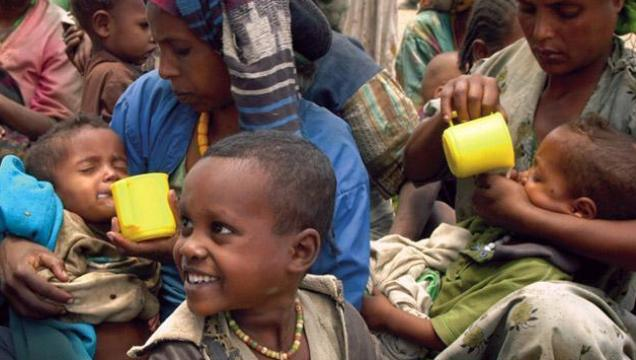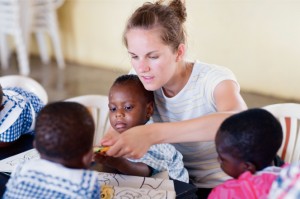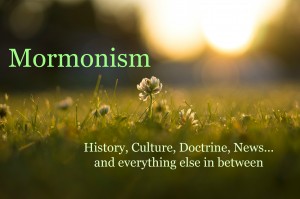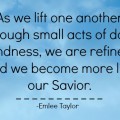Recently, I wrote an article here about one of my ancestors. He was noted for his devotion to caring for the poor in his town, feeding hundreds of hungry people who lined up at his door each day. What I didn’t mention was that nearly everyone in this town was family. It was a small mountain town in Kentucky, and their isolation led to most people in town being related, often through several different lines.
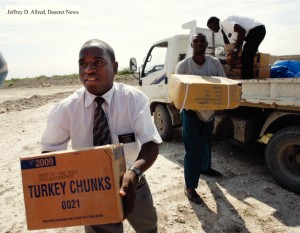 I’ve sometimes thought of how much easier it is to serve those you know are family. In truth, though, we’re all family. The Bible starts with a single family, Adam and Eve. That set of parents had many children, far more than those mentioned in the Bible, and their children married each other. (Surely, you wondered where the spouses came from.) From that single family has come every person who has ever lived. We’re all cousins to one degree or another. Mormons believe that. We believe that Adam and Eve are real.
I’ve sometimes thought of how much easier it is to serve those you know are family. In truth, though, we’re all family. The Bible starts with a single family, Adam and Eve. That set of parents had many children, far more than those mentioned in the Bible, and their children married each other. (Surely, you wondered where the spouses came from.) From that single family has come every person who has ever lived. We’re all cousins to one degree or another. Mormons believe that. We believe that Adam and Eve are real.
We have yet another evidence of our inter-connectedness. Mormons believe we are all literally the children of God. He created our spirits and we lived with Him for a while before coming to Earth. Sharing the same eternal parents also makes us family.
But it doesn’t end there. Mormons also believe that “’Till death do you part” was not part of God’s plan. We believe God meant for us to remain married, to remain parents, grandparents, aunts, uncles, and families forever. This is why Mormons are encouraged to marry in their temples, where marriages are performed “for time and all eternity” instead of scheduling the deathbed divorce in the middle of the wedding ceremony. Since I can be “sealed” (joined forever) to my own parents and they to their parents and so on down the line, if everyone cooperates, we are all made into a family forever. At the very least, those who value their families enough to keep them forever will be family. Once again, we’re taken back to the Adam and Eve beginnings.
There is no getting around it in Mormonism: We’re all family. And because we’re all family, serving one another should come easily. Whether we’re feeding the hungry, watching a child whose parents are away, or mowing the neighbor’s lawn, it’s all service at the family level.
“We must remember that those mortals we meet in parking lots, offices, elevators, and elsewhere are that portion of mankind God has given us to love and to serve. It will do us little good to speak of the general brotherhood of mankind if we cannot regard those who are all around us as our brothers and sisters,” The Teachings of Spencer W. Kimball, ed. Edward L. Kimball (1982), 483.
Dieter F. Uchtdorf, a Mormon apostle, tells of being a child in Europe after World War II. His family relied for a time on charity the Mormons gave to refugees. He was made fun of personally and many Mormons used a rude name for people who became Mormon as a result of these handouts, Büchsen Mormonen, which means Canned-Food Mormons. Many believed the people joined the Church only to get handouts and would leave once they no longer needed them. Some did, of course, but many did not, and their descendants are still in the Church today. President Uchtdorf urges everyone, including Mormons, to respect others and to treat them with love and respect.
“Every person we meet is a VIP to our Heavenly Father. Once we understand that, we can begin to understand how we should treat our fellowmen,” Dieter F. Uchtdorf, You Are My Hands,” April 2010 General Conference of The Church of Jesus Christ of Latter-day Saints).
President Uchtdorf reminds us that while it is wonderful to talk about love, talking isn’t enough. We have to live it. God has given us patterns for how we treat other people and when we do this, we change the world and the lives of our eternal families.
“The Savior revealed the perfect priorities for our lives, our homes, our wards, our communities, and our nations when He spoke of love as the great commandment upon which “hang all the law and the prophets.” We can spend our days obsessing about the finest details of life, the law, and long lists of things to do; but should we neglect the great commandments, we are missing the point and we are clouds without water, drifting in the winds, and trees without fruit.
In the end, in Mormonism, we are all family, not just to other Mormons, but to everyone on Earth, past present, and future—and families love each other and take care of each other. This is one reason Mormons work so hard at humanitarian efforts, even in countries with very few Mormons, taking their service to anyone who needs it. When we understand that our family connection goes all the way back to the very moment of our spirit’s creation, it becomes easier to try to make sure no one in the family is alone, lonely, or suffering. We’re family—God’s family.
About Terrie Lynn Bittner
The late Terrie Lynn Bittner—beloved wife, mother, grandmother, and friend—was the author of two homeschooling books and numerous articles, including several that appeared in Latter-day Saint magazines. She became a member of the Church at the age of 17 and began sharing her faith online in 1992.

